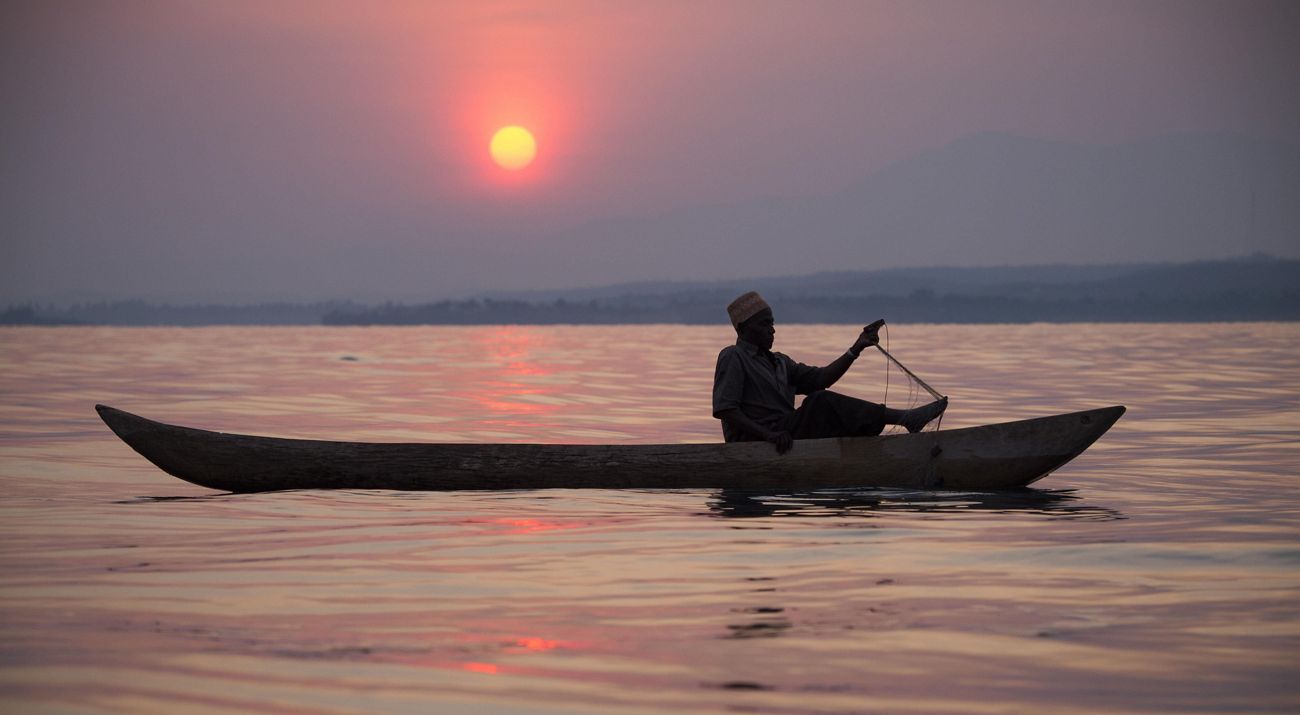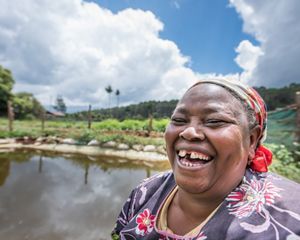The Tuungane Project
TNC is working to create healthier families, fisheries and forests in western Tanzania.

As the sun rises over Mount Nkungwe, the highest peak in the Mahale Mountains, fishermen far below float quietly across Lake Tanganyika as they return from a night of fishing. The surrounding forest comes alive with the calls of birds and chimpanzees.
The world’s longest lake, Tanganyika holds 17 percent of our planet’s fresh water and boasts more than 300 fish species. For tens of thousands of people who live along it, the lake is their water fountain, highway and grocery store.
Rising eastward from the shoreline, the Greater Mahale Ecosystem encompasses 4.8 million acres of mostly forested landscape. This ecosystem is home to approximately 93 percent of Tanzania’s 2,800 endangered chimpanzees, only some of which live within Mahale Mountains National Park.
Tuungane Project: Uniting People and Nature
The health of this diverse natural environment and the well-being of its people are threatened by extreme poverty compounded by a rapidly growing human population.
These remote villages lack access to health services, modern contraception, clean and safe drinking water, and education. With populations spiraling upward, settlements and farms are encroaching into wild, forested lands. As more forest is cleared haphazardly for agriculture, sediment clogs coastal fish breeding zones and fisheries decline.
Tuungane (pronounced TOO-un-gah-nee, Kiswahili for “Let’s Unite”) is a collaboration between the The Nature Conservancy and Pathfinder International, a global reproductive health organization. TNC and Pathfinder are also engaging other stakeholders to achieve holistic, large-scale impact, including Frankfurt Zoological Society, Carbon Tanzania, Jane Goodall Institute, Tanzania National Parks (TANAPA), Tongwe Trust and the Government of Tanzania.




Tuungane Project Milestones
Tuungane is expressly designed to create integrated solutions to create healthier families, fisheries and forests. The Tuungane Project has achieved a lot since its inception in 2012, including:
Model Households: Nearly 11,000 families volunteer as “Model Households” to educate by example. These families model healthy and sustainable behaviors, such as using a hand-washing station, installing an upgrade latrine, prioritizing family planning, using energy saving stoves and setting their agricultural plots away from the lake.
Beach Management Units: Twenty-three coastal villages have established Beach Management Units (BMUs) to enact and enforce their own sustainable fishing regulations, such as outlawing destructive beach seine nets and under-sized fishing nets, and protecting fish breeding and nurseries zones. More than 28,000 hectares of community fish reserves are now protected. BMUs are also using electronic monitoring of fish catch data to better manage their fisheries.
Microfinance: Villages have established 51 community conservation banks (COCOBAs), giving more than $100,000 USD in small loans to 1,700 people who are starting small businesses and diversifying their incomes.
Reproductive Health: The number of children per woman in this region is 7.1 births—one of the highest in the world. More than 150,000 requests for reproductive health resources have been met. Upgrades to health clinics—such as 16 solar suitcases that can provide electricity during nighttime births—are dramatically reducing maternal and neonatal deaths.
Supporting Girls’ Education: TNC supporters recently funded a girls’ dormitory for the Lagosa Secondary School, which gives young women an opportunity to overcome many obstacles to staying in school. Education provides women more opportunities to become employed, earn an income and reduce their overall reliance on natural resources.
Climate Smart Agriculture: Most villagers do at least some subsistence farming. The Tuungane Project is providing training on climate smart agriculture practices, which not only reduce run-off into the lake, but produce higher yields for the farmers. More than 20,000 farmers have been trained in these techniques, and those implementing the methods have seen an average 50% increase in crop yields.
Forest Management: The forested areas of the Greater Mahale Ecosystem are under threat from agricultural expansion, indiscriminate fires, and illegal forest harvesting. 301,000 acres of Village Land Forest Reserves with approved management plans protect key chimp habitat, and 116 forest scouts have been trained and deployed. A new program with partner Carbon Tanzania is helping eight villages in the Ntakata Mountain area earn a sustainable income through carbon credits earned from protecting their trees.
Donate to Support the Tuungane Project
We’ve made significant progress since the launch of the Tuungane Project, but we still have a long way to go to ensure the long-term protection of these amazing natural systems and the critical resources they provide to people. Will you help us advance this critical work?


